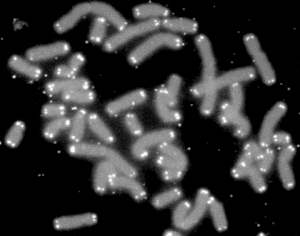Robin Smith, Health Content Scientist
Some scientists believe that lobsters could live virtually forever, barring injury, disease, or capture. They are among a select group of animals, including tortoises, clams, and jellyfish, that are “negligibly senescent.”

They don’t age much. So why aren’t we so lucky?
Consider the Lobster
Unlike lobsters, our cells cannot replicate and renew themselves throughout our lives. One cause of this limitation is our telomeres, which are DNA segments at the ends of our chromosomes that get shorter with each replication.
When a cell’s telomeres get too short, it can no longer replicate and eventually dies. A few cells—namely adult stem cells, sperm, and egg cells—are not limited by this process, though. These cells have a telomerase enzyme that can rebuild telomeres when they get too short. This process is hijacked by cancer cells, which become effectively immortal by turning on telomerase.
Telomeres and Aging
There are several indications that telomere length is a good predictor of longevity. In newborns, telomere length varies from about 8,000-13,000 “base pairs” (DNA letters) in length and declines by about 20-40 base pairs each year. Telomeres are also longer in women than men, mirroring the difference in lifespan between the sexes. In elderly twins, the twin with shorter telomeres is roughly three times more likely to die first.
The variability in telomere length between people of the same age is not random and has a genetic component that has interested scientists for decades. In a recent study in the Nature Genetics journal, scientists identified multiple markers associated with either shorter or longer telomeres.
The strongest of these resides near a gene named TERC. Each copy of a “T” at this position is associated with an average 117 base pair decrease in telomere length, equivalent to having the “biological age” of a person about four years older.
Other Factors in Aging
A person’s genetic makeup is not the only determinant of telomere length; environmental factors such as smoking and obesity bring about premature telomere shortening.
Telomere length is also highly influenced by the father’s age at conception. Because sperm cells are one of only a few types of cells that maintain or even increase their telomere length over time, the trend is for older fathers to have children with longer telomeres.
This effect can even carry over to a second generation, including grandchildren. It’s interesting to speculate that trends in some societies towards delaying parenthood may have the unexpected benefit of boosting life expectancy. Any such benefit, however, would have to be weighed against the known risks of being an older dad.



